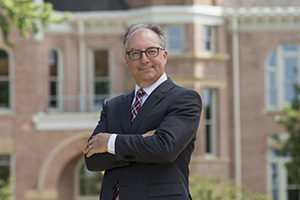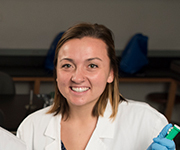Redeeming Learning and the Ships of Tarshish
BY DR. MARK HUSBANDS

Imagine sitting in the front of a 7:45 a.m. macroeconomics lecture. Instead of beginning her lecture with a discussion of the comparative advantage and the benefits of trade, your professor opens by reading Isaiah 2:8-16: “For the Lord of hosts has a day against all that is proud and lofty, against all that is lifted up and high ... against all the ships of Tarshish, and against all the beautiful craft.”
As soon as she turns to the subject of international trade, you quickly forget about these ancient ships of commerce. Or so it seems.
It turns out that an important key to understanding the world well is learning how to read the “two books of revelation”: Scripture and natural knowledge. Listen to how John Calvin expresses this in the opening of the Institutes of the Christian Religion, “Nearly all the wisdom we possess ... consists of two parts: the knowledge of God and of ourselves.” To which he adds, “In the first place, no one can look upon himself without immediately turning his thoughts to the contemplation of God, in whom he ‘lives and moves.’” The most important thing to take from Calvin at this point is that our very capacity to learn is itself a remarkable gift from God.
You would be right to ask what all of this means for the calling of Christian professors. The answer to this question might cast some light upon the relationship between macroeconomics and that prophecy of Isaiah. Having spent a significant portion of their adult lives seeking to master their academic disciplines, professors live with the challenge of conveying complex ideas and skills to young fertile minds and hearts. As you can imagine, this is as demanding as it is rewarding.
It’s a tremendous gift to realize that teaching, scholarship and creative work may well serve the larger purpose of drawing others to see the glory of God manifest in the life, death and resurrection of Christ. Sadly, however, very few schools train faculty to do this well.
Commenting on the state of higher education in the U.S., New York Times columnist David Brooks writes: “Most universities have gotten out of the business of spiritual and character development, and they’ve adopted a research ideal ... It teaches students how to do things but less why they should do them and less how to think about what is their highest and best life. To ask about the meaning of life is to appear unprofessional” (emphasis mine). How, you might ask, is Northwestern any different?
Northwestern is committed to teaching students to live lives of meaning and purpose in light of the biblical claim that “all things have been created through [Christ] and for him” (Colossians 1:16). To this end, we’ve instituted a new Faith and Learning Seminar for faculty with the express purpose of providing them with a biblical and theological vision capable of sustaining a commitment to the scholarly pursuit of the truth, glory and redemptive work of the triune God.
Each year approximately eight faculty meet once a week in a graduate-style seminar to engage the biblical message and grow in their ability to articulate key Christian claims. This shared study and reflection gives rise to a renewed sense of joy in the work of helping students see that all things—even the ships of Tarshish—belong to God.
Indeed, as Isaiah 60 reveals, ancient vessels are transformed to serve the economic well-being of the city of God. In short, God cares deeply about every facet of life. At Northwestern College this profound truth means that we understand that the study of biology, ceramics, Spanish—or even macroeconomics—have, in divine providence and mercy, eternal significance. In the end, even the ships of Tarshish can be redeemed.
Mark Husbands is in his second year as Northwestern’s vice president for academic affairs. He previously served as the Leonard and Marjorie Maas Chair of Reformed Theology and director of the Emmaus Scholars Program at Hope College in Holland, Mich., and taught theology at Wheaton College and Tyndale University College and Seminary.
 A research interest that started at NWC has led to psychology professor Amanda Brouwer’s first book and offers help for those who want to get healthy and stay that way.
A research interest that started at NWC has led to psychology professor Amanda Brouwer’s first book and offers help for those who want to get healthy and stay that way. Participation in pioneering study helps Northwestern students explore careers as research scientists.
Participation in pioneering study helps Northwestern students explore careers as research scientists. Alumni share stories about the best things they found in their campus mailbox.
Alumni share stories about the best things they found in their campus mailbox. 6 Questions with Scott Simmelink
6 Questions with Scott Simmelink
Classic Comments
All comments are moderated and need approval from the moderator before they are posted. Comments that include profanity, or personal attacks, or antisocial behavior such as "spamming" or other inappropriate comments or material will be removed from the site. We will take steps to block users who violate any of our terms of use. You are fully responsible for the content that you post. Comments posted do not reflect the views or values of Northwestern College.